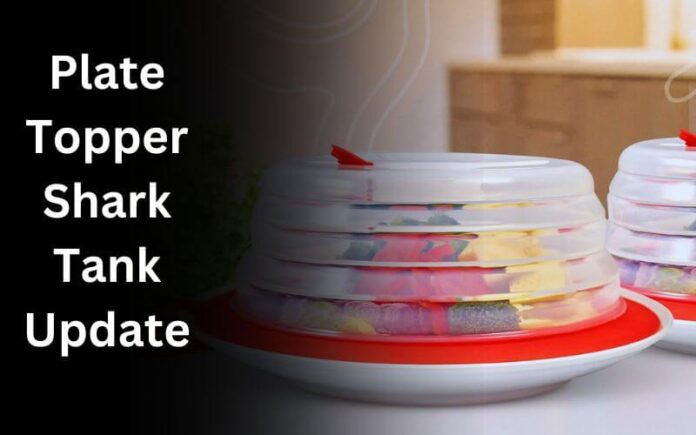Shark Tank, the popular reality TV show, has been a platform for numerous innovative products and aspiring entrepreneurs. One such product that caught the attention of the sharks and viewers alike was Plate Topper, a unique food storage solution created by Michael Tseng. In this blog post, we’ll dive into the Plate Topper’s journey on Shark Tank, its impressive pitch, the deal struck, and the unfortunate turn of events that followed.
The Plate Topper Pitch and Deal at Shark Tank
Michael Tseng, the inventor of Plate Topper, appeared on Season 4 of Shark Tank with an innovative product that promised to revolutionize food storage. Plate Topper, an airtight plate cover, aimed to provide a convenient and safe way to store leftovers or unfinished meals. Tseng’s pitch was impressive, highlighting the product’s versatility, functionality, and safety features. He asked for $90,000 in exchange for a 5% stake in his company, valuing the business at $1.8 million.
The sharks were intrigued by Plate Topper’s potential, and Tseng revealed that the product had already made its way into major retailers like QVC and Walmart. In just four months, Plate Topper had garnered $1 million in pre-orders, demonstrating its market appeal. The impressive sales figures and the product’s uniqueness sparked a bidding war among the sharks.
Lori Greiner, known as the “Queen of QVC,” offered $900,000 for a 30% stake in the company, while Daymond John proposed $1 million for a 25% stake. The high offers reflected the sharks’ confidence in Plate Topper’s potential for success.
However, the negotiations took an unexpected turn when Tseng argued that his company was worth more than the $1.8 million valuation he had initially proposed. This stance led to some sharks withdrawing their offers, as they felt Tseng was overvaluing his business.
In the end, Lori Greiner revised her offer to $90,000 for an 8% stake, aligning with Tseng’s original ask. Tseng accepted the deal, seemingly securing a partnership with one of the most successful sharks on the show.
Plate Topper Is Gone Out of Business
Despite the promising start and the successful pitch on Shark Tank, Plate Topper’s journey took a disappointing turn. The deal with Lori Greiner never came to fruition, and the reasons behind this remain unclear. Consequently, Plate Topper struggled to maintain its momentum in the market.
As of October 2022, Michael Tseng’s company is no longer in business, and the Plate Topper product has been discontinued. The once-promising food storage solution failed to sustain its initial success, leaving many wondering what went wrong.
What Was Plate Topper Net Worth?
During his Shark Tank pitch, Michael Tseng valued his company at $1.8 million, based on his ask of $90,000 for a 5% stake. However, the actual net worth of Plate Topper remains unclear, as the company’s financial details were not publicly disclosed after the show.
The $1 million in pre-orders mentioned during the pitch indicated strong initial sales, but the long-term financial performance of the company is unknown. Without further information, it is difficult to determine Plate Topper’s net worth at any given point in its short-lived existence.
Impact of Shark Tank on Plate Topper
Appearing on Shark Tank can be a game-changer for many businesses, providing them with national exposure, invaluable mentorship, and access to a broader market. However, in the case of Plate Topper, the impact of the show was limited.
While the initial buzz generated by the Shark Tank appearance might have boosted sales and brand recognition temporarily, it was not enough to sustain the company’s growth in the long run. The failure to finalize the deal with Lori Greiner, coupled with other unknown factors, likely contributed to Plate Topper’s eventual demise.
It’s important to note that not all Shark Tank deals come to fruition, and even those that do may not guarantee long-term success. The show provides a platform for entrepreneurs to showcase their products and secure investments, but the real work begins after the cameras stop rolling.
Business Overview
Plate Topper, founded by Michael Tseng, was a company that aimed to revolutionize food storage with its innovative airtight plate covers. The product was designed to provide a convenient and safe way to store leftovers or unfinished meals, addressing common food storage issues.
The company had already made inroads into major retailers like QVC and Walmart, indicating a strong market presence and demand for the product. The $1 million in pre-orders mentioned during the Shark Tank pitch further demonstrated the potential for success.
However, despite the promising start and the interest from the sharks, Plate Topper failed to capitalize on its momentum. The reasons behind the company’s eventual failure remain unclear, but it serves as a reminder that securing a Shark Tank deal is not a guarantee of long-term success.
As of October 2022, Plate Topper is no longer in business, and the product has been discontinued. The rise and fall of Michael Tseng’s food storage solution serve as a cautionary tale for entrepreneurs, highlighting the challenges of sustaining a business even after a successful Shark Tank appearance.
Conclusion
The story of Plate Topper on Shark Tank is one of initial promise and ultimate disappointment. Michael Tseng’s innovative food storage solution captured the attention of the sharks and viewers, securing a deal with Lori Greiner. However, the deal never materialized, and the company eventually went out of business.
Plate Topper’s journey serves as a reminder that success on Shark Tank does not always translate to long-term viability. While the show provides invaluable exposure and potential investments, entrepreneurs must navigate the challenges of sustaining and growing their businesses in the real world.
As we reflect on the rise and fall of Plate Topper, it’s essential to learn from their experience and understand that the path to entrepreneurial success is often filled with obstacles and setbacks. Aspiring entrepreneurs should focus on building strong foundations, adapting to market demands, and persevering through the challenges that come their way.
Also Read:
